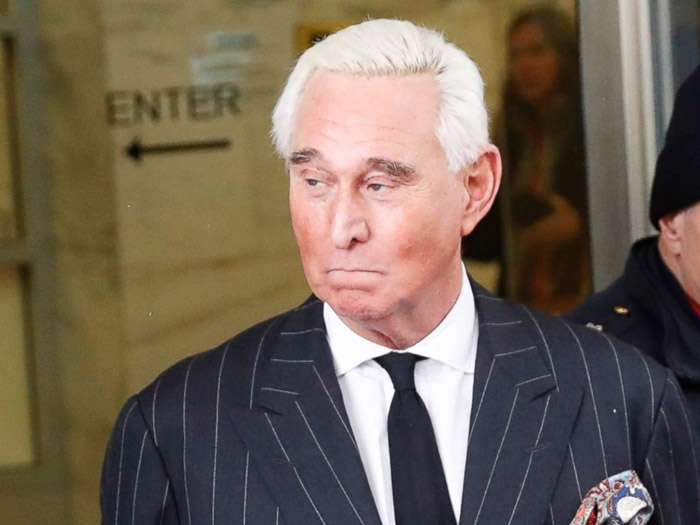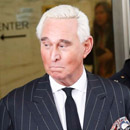Roger Stone Is Guilty in U.S. Trial Over Lies About 2016 Leaks
Bloomberg
Fri November 15, 2019
Area: Washington, DC (Hagerstown)
Roger Stone, the longtime Republican operative and early Trump booster, was convicted of lying to Congress, obstructing a congressional probe and witness tampering, just two days after House Democrats separately began public impeachment hearings.
The U.S. case against Stone - the last person charged during Special Counsel Robert Mueller's 22-month investigation of Russian interference in the 2016 U.S. election - included evidence that President Donald Trump knew about WikiLeaks' plans to release emails damaging to his rival, Hillary Clinton. Jurors in federal court in Washington began deliberating on Thursday.
Stone lied to Congress to protect the president, prosecutors said.
Stone's conviction on all seven counts at trial follows that of Paul Manafort, Trump's 2016 campaign chairman, and the guilty pleas of Manafort's top deputy, Rick Gates, the president's first national security adviser, Mike Flynn, and his former personal lawyer, Michael Cohen. The charges against Stone, 67, stemmed from his September 2017 testimony before the House Intelligence Committee, which was also probing Russian meddling.
Friday's verdict comes as the House weighs whether to impeach the president for tying almost $400 million in military aid to Ukraine to its willingness to open a criminal probe of Trump rival Joe Biden and his son, Hunter.
Stone's trial centered on the former Trump adviser's boasts in 2016 that he knew about the WikiLeaks dirt on Clinton and her campaign chairman and when it would be made public.
The lobbyist and Twitter provocateur was accused of withholding from the congressional panel evidence of his conversations with two possible intermediaries -- Randy Credico, a comedian and talk show host, and the conservative author and conspiracy theorist Jerome Corsi -- both of whom communicated with WikiLeaks, according to the U.S.
In answering questions from the House committee, prosecutors say, Stone deliberately omitted Corsi, with whom he corresponded about WikiLeaks releases in July and August 2016. Jurors heard from Credico, who bolstered prosecutors' case that Corsi was the true WikiLeaks liaison by testifying that he himself wasn't in touch with Stone about WikiLeaks during the period in question. That contradicted what Stone had told the House panel, prosecutors said.
The U.S. also pursued Stone's contacts with the campaign. Gates, the 2016 deputy chairman, testified for prosecutors that during a phone call Trump took on the way to the airport with him in 2016, the candidate heard directly from Stone that WikiLeaks planned future releases. Trump had said in a written reply to Mueller that he didn't recall any such conversations.
Prosecutors summoned Steve Bannon, the chief executive of Trump's campaign, to tell jurors that he viewed Stone as the campaign's "access point" to WikiLeaks and its trove of stolen documents on Clinton that U.S. intelligence concluded were stilen by Russia. He said Stone bragged of his relationship with WikiLeaks and its founder, Julian Assange.
Early in the trial, former FBI agent Michelle Taylor, who worked on Mueller's team, used a chart to identify 25 calls Stone had with Manafort, 28 with Gates, two with Bannon and two with Trump himself, including the call in the car en route to the airport.
Credico testified that Stone pressured him to confirm his House testimony, to claim he couldn't recall or to assert his right against self-incrimination, as Credico ultimately did. Messages between the two included references to Frank Pentangeli, the "Godfather" character who experiences a memory lapse when he appears before the U.S. Senate to finger the mob.
But Credico did concede that it was he, not Stone, who first mentioned Pentangeli and that he never took seriously Stone's threat to snatch his dog unless he complied. He also allowed he sometimes overplayed his own WikiLeaks insights when communicating with Stone as part of a rivalry between the two, and occasionally lied to Stone about what he knew to get Stone off his back.
The defense denied that Stone gleaned secret WikiLeaks intelligence ahead of time and shared it with the Trump campaign, saying that his tweets and other predictions were the sort of grandstanding typical of the outsize fixer and based on public information. Lawyers for Stone said he had no motive to lie when testifying before Congress because his conversations about WikiLeaks weren't illegal.
Stone thought the House committee, which questioned him for more than three hours and posed almost 600 questions, was asking about Russian interference in the election, since that was the stated scope of its investigation, and not about WikiLeaks, his lawyers said. It was the context in which those questions were asked, and how Stone understood it, that exonerated him, his lawyers told the jury of nine women and three men.
Stone didn't testify at the trial, which began on Nov. 7. On the defense case, his lawyers merely played excerpts of his House testimony.
The case is U.S. v. Stone, 19-cr-18, U.S. District Court, District of Columbia (Washington).





 Share your thoughts in the Forum
Share your thoughts in the Forum
